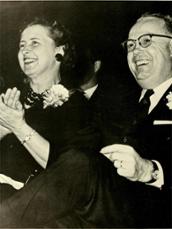Mildred Dickerson
Mrs. D: an exemplary mentor
Professors We Love Originally published in Summer 2001, this is just one of many stories from Madison magazine's award-winning Professors You Love series, written by JMU students and alumni, about the professors that have made the most impact on their lives — then, and now.
Originally published in Summer 2001, this is just one of many stories from Madison magazine's award-winning Professors You Love series, written by JMU students and alumni, about the professors that have made the most impact on their lives — then, and now.
As I worked with "Mrs. D" at Anthony-Seeger teaching lab school, across the street from what was the Madison campus of the 1960s, I began a process that directly opened up my understanding of young children as they grew and developed. Our nursery school was a human relations laboratory. There I was guided in learning about and applying appropriate responses and actions as I worked directly with young children — not just blindly reacting to theories I had read about.
"After I applied to the Peace Corps and the U.S. government came to her for a reference, she told me that she informed them that I was good with adults as well as with children."Mrs. D believed in her students and treated us with the same love and respect that she showed each nursery school child and their parents. She taught by example, not just theory. She was forever bringing in examples of children's art and explaining the different learning stages long before many knew much about this subject. Through her, we learned why and how young children learn best. We learned to look deeply at young children and ultimately at ourselves.
After working in the lab, we would go to Mrs. D's class and discuss what we experienced during the day with children. That was great hands-on experience, which is the best kind of education in my opinion, because it truly touches upon and reinforces all the many ways people learn. We learned to look mindfully at situations involving young children in order to understand more about human behavior. Under Mrs. Dickerson's watchful eye, I began to grow in patience, compassion and understanding.
She believed in each of her students and told us so. After I applied to the Peace Corps and the U.S. government came to her for a reference, she told me that she informed them that I was good with adults as well as with children. From that moment on, my self-esteem grew.
Among the warmest memories I have of Mrs. D — and there are many — was when we discussed the concept of "newborn bonding." Mammals are imprinted with the first thing they see after being born. Nature has programmed this for their survival. For example, if a human, rather than a mother hen, cares for a newly hatched chick, it will soon follow the human caretaker even if later introduced to a mature chicken.
One warm spring day, Mrs. Dickerson had a local farmer's wife bring an orphaned baby lamb to class. The woman, who looked a lot like Mrs. D, was raising this lamb herself. Mrs. Dickerson gathered up her skirt in one hand and began walking around the playground to illustrate how a baby lamb would follow and bond with its "mother." The lamb immediately began following. Mrs. D began walking faster, jumping over poles on the ground, and the little lamb copied each of her specific actions. Each time I think of Mrs. D. running and jumping holding her dress around her, I dissolve in giggles. What a marvelous way to imprint upon her students the very concept we were studying.

Several years later, when my own children were born, this bonding concept was very much in the forefront and influenced my decision to become a Lamaze teacher. Since my Madison College days, I have gone on to years of graduate work and courses all over the world with prominent educators in their fields. Mildred Dickerson unquestionably was the professor who most changed my life, because through her I changed my behaviors after learning and practicing more appropriate and useful ways of relating to people. She taught through books and lectures, but more importantly she taught through example. It was the kind of person she was that made the difference.
Through the years we have kept in touch. I still appreciate the mentoring through occasional cards and letters as we share with each other our life's journeys. She is the kind of person who still makes me want to be the best person I can be in any situation because I don't want to let her or myself down.
About the professor
Mildred Dickerson taught in the education department's nursery school from its inception. She served the JMU faculty from 1958 to 1986, retiring as a professor of early childhood education. Her husband, Z.S. Dickerson, helped establish the computer science program. He retired as associate dean of the School of Business.
About the author
Louise Schullery Cox earned her elementary education degree from JMU in 1967 and her master's in early childhood education from the University of Illinois. She studied and worked as a Peace Corps volunteer in Sierra Leone, West Africa, from 1967 to 1969. She later taught at Rhode Island College. She and her husband, David Vania, also a Peace Corps veteran, have lived in Saudi Arabia and Brazil where they taught at international schools. Currently Cox teaches English and adult life skills to immigrants and works for the Child Development Center at a Hartford, Conn., community college.

